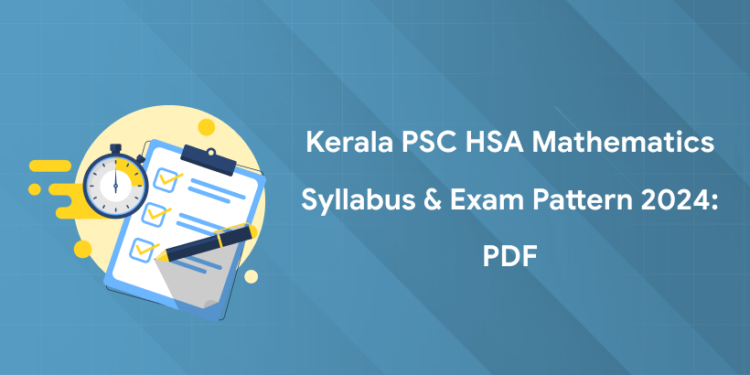Table of Contents
Kerala PSC HSA Mathematics Syllabus & Exam Pattern 2024 Released! As the Kerala Public Service Commission (KPSC) prepares for the High School Assistant (HSA) Exam 2024, it’s crucial for candidates to understand the syllabus and exam pattern for HSA Mathematics. This syllabus will cover essential topics in mathematics, including algebra, geometry, trigonometry, and statistics.
The exam pattern will detail the structure of the test, including the number of questions, marking scheme, and duration. In this article, we will provide a concise overview of the syllabus and exam pattern, along with a downloadable PDF link for easy access.
By familiarizing yourself with the syllabus, you can effectively prepare and enhance your chances of success. Let’s explore the key details you need for the HSA Mathematics exam!
KERALA PSC HSA ONLINE COACHING – FREE DEMO
Kerala PSC HSA Mathematics Syllabus & Exam Pattern 2024 Overview
| KPSC High School Assistant Mathematics Recruitment 2024 | |
| Authority | Kerala Public Service Commission (PSC) |
| Name of the post | High School Assistant Mathematics |
| Department | Education |
| Exam Type | Objective multiple choice |
| Exam mode | OMR/ Online |
| Total marks | 100 |
| Official website | keralapsc.gov.in |
Kerala PSC HSA Mathematics Syllabus & Exam Pattern 2024 – PDF
1: The first recipient of the ‘Rajiv Gandhi Khel Ratna’ award?
To assist you in your preparation, we have provided a downloadable PDF of the Kerala PSC HSA Mathematics Syllabus and Exam Pattern for 2024. This PDF document contains all the essential topics and detailed exam structure, making it easy for you to study effectively.
Kerala PSC HSA Mathematics Exam Pattern 2024: Structure
The Kerala Public Service Commission HSA Exam consists of two stages: a written examination and an interview. The written test is divided into two parts: Preliminary and Main. The Preliminary exam features objective-type questions based on the HSA syllabus. Upon passing this stage, candidates will face the Main exam, which includes descriptive-type questions. The interview assesses the candidate’s aptitude, knowledge, and teaching skills.
- Exam Mode
- Conducted in offline mode.
- Exam Pattern
- Type: Objective type
- Total Questions: 100
- Marks: Each correct answer awards 1 mark.
- Duration: 1 hour and 30 minutes to complete the exam.
| Parts | Name of Subject | Number of Marks |
| Part I | General Knowledge, Current Affairs, Renaissance in Kerala | 15 marks |
| Part II | Teaching Methodology | 5 marks |
| Part III | Subject | 80 marks |
| Total Marks | 100 Marks | |
| Duration: 1 Hour 30 Minutes | ||
Kerala PSC HSA Mathematics Syllabus 2024 – Detailed
The Kerala PSC HSA Mathematics syllabus for 2024 covers essential topics including algebra, geometry, trigonometry, statistics, and arithmetic. Candidates will focus on problem-solving techniques, mathematical reasoning, and the application of concepts. This syllabus is designed to assess candidates’ proficiency in mathematics, preparing them for the High School Assistant role. Detailed information is provided below.
PART I (15 Marks)
Module I: Renaissance and Freedom Movement
Module II: General Knowledge and Current Affairs
PART II (5 Marks)
Module III: Methodology of Teaching the Subject
- History and conceptual development: Need and significance, meaning, nature, and scope of the subject.
- Correlation with other subjects and real-life situations.
- Aims, objectives, and values of teaching: Taxonomy of Educational Objectives—both old and revised.
- Pedagogic analysis: Need, significance, and principles.
- Planning of instruction at the secondary level: Need and importance. Psychological bases of teaching the subject, including implications of Piaget, Bruner, Gagne, Vygotsky, Ausubel, and Gardner—addressing individual differences, motivation, and maxims of teaching.
- Methods and strategies for teaching the subject: Models of teaching and techniques for individualizing instruction.
- Curriculum – Definition, Principles, Modern trends and organizational approaches, Curriculum reforms – NCF/KCF.
- Instructional resources- Laboratory, Library, Club, Museum- Visual and Audio-Visual aids – Community based resources – e-resources – Text book, Work book and Hand book.
- Assessment; Evaluation- Concepts, Purpose, Types, Principles, Modern techniques – CCE and Grading- Tools and techniques – Qualities of a good test – Types of test items- Evaluation of projects, Seminars and Assignments – Achievement test, Diagnostic test – Construction, Characteristics, interpretation and remediation.
- Teacher – Qualities and Competencies – different roles – Personal Qualities – Essential teaching skills – Microteaching – Action research.
PART III (80 Marks)
Module I
- Elementary Set Theory: Relations, Partial Order, Equivalence Relations, Functions, Bijections, Composition, Inverse Functions
- Quadratic Equations: Relation Between Roots and Coefficients
- Mathematical Induction
- Permutation and Combination
- Trigonometric Functions: Identities, Solution of Triangles, Heights, and Distances
- Geometry: Length and Area of Polygons and Circles
- Solids: Surface Area and Volume, Euler’s Formula
Module II
- Theory of Numbers: Divisibility, Division Algorithm, GCD, LCM, Relatively Prime Numbers (Coprimes), Fundamental Theorem of Arithmetic, Congruences, Solution of Linear Congruences, Fermat’s Theorem
- Matrices: Addition, Multiplication, Transpose, Determinants, Singular Matrices, Inverse, Symmetric, Skew-Symmetric, Hermitian, Skew-Hermitian, Orthogonal Matrices, Normal Form, Echelon Form, Rank of a Matrix, Solution of Systems of Linear Equations, Eigenvalues, Eigenvectors, Cayley-Hamilton Theorem
Module III
- Calculus: Limits, Continuity, Differentiability, Derivatives, Intermediate Value Theorem, Rolle’s Theorem, Mean Value Theorem, Taylor and Maclaurin Series, L’Hôpital’s Rule
- Partial Differentiation: Homogeneous Functions, Euler’s Formula
- Applications of Differentiation: Maxima and Minima, Critical Points, Concavity, Points of Inflection, Asymptotes, Tangents, and Normals
- Integration: Methods of Integration, Definite Integrals and Their Properties
- Applications of Integration: Area Between Curves, Volume, and Area of Revolution
- Double and Triple Integrals
- Conic Sections: Standard Equations of Parabola, Ellipse, Hyperbola, Cartesian, Parametric, and Polar Forms
Module IV
- Bounded Sets: Infimum, Supremum, Order Completeness, Neighborhood, Interior, Open Sets, Closed Sets, Limit Points
- Bolzano-Weierstrass Theorem: Closed Sets, Dense Sets, Countable Sets, Uncountable Sets
- Sequences: Convergence and Divergence, Monotonic Sequences, Subsequences
- Series: Convergence and Divergence, Absolute Convergence, Cauchy’s General Principle of Convergence
- Tests for Convergence of Series: Comparison Test, Root Test, Ratio Test
- Continuity and Uniform Continuity: Riemann Integrals, Properties, Integrability
- Complex Numbers: Modulus, Conjugates, Polar Form, Nth Roots of Complex Numbers
- Functions of Complex Variables: Elementary Functions, Analytic Functions, Taylor Series, Laurent Series
Module V
- Vectors: Unit Vectors, Collinear Vectors, Coplanar Vectors, Like and Unlike Vectors, Orthogonal Triads (i, j, k)
- Dot Product and Cross Product: Properties
- Vector Differentiation: Unit Tangent Vector, Unit Normal Vector, Curvature, Torsion, Vector Fields, Scalar Fields, Gradient, Divergence, Curl, Directional Derivatives
- Vector Integration: Line Integrals, Conservative Fields, Green’s Theorem, Surface Integrals, Stokes’ Theorem, Divergence Theorem
Module VI
- Data Representation: Raw Data, Classification, Tabulation, Frequency Tables, Contingency Tables
- Diagrams: Bar Diagrams, Subdivided Bar Diagrams, Pie Diagrams, Graphs (Frequency Polygon, Frequency Curve, Ogives)
- Descriptive Statistics: Percentiles, Deciles, Quartiles, Arithmetic Mean, Median, Mode, Geometric Mean, Harmonic Mean, Range, Mean Deviation, Variance, Standard Deviation, Quartile Deviation, Coefficient of Variation, Moments, Skewness, and Kurtosis
Module VII
- Probability: Random Experiment, Sample Space, Events, Types of Events, Independence of Events, Definitions of Probability, Addition Theorem, Conditional Probability, Multiplication Theorem, Bayes’ Theorem
- Random Variables and Probability Distributions: Random Variables, Mathematical Expectation, Properties of Probability Mass Function, Probability Density Function, and Distribution Function
- Independence of Random Variables: Moment Generating Function, Standard Distributions (Uniform, Binomial, Poisson, Normal Distribution)
- Bivariate Distribution: Joint Distribution of Two Random Variables, Marginal and Conditional Distributions
Module VIII
- Random Sampling Methods: Sampling and Census, Sampling and Non-Sampling Errors, Simple Random Sampling, Systematic Sampling, Stratified Sampling
- Sampling Distributions: Parameter and Statistic, Standard Error, Sampling Distributions (Normal, t, F, Chi-Square Distributions), Central Limit Theorem
- Estimates: Desirable Properties (Unbiasedness, Consistency, Sufficiency, Efficiency)
- Testing of Hypotheses: Basic Concepts (Simple and Composite Hypotheses, Null and Alternate Hypotheses, Type I Error, Type II Error, Level of Significance, Power of a Test)
How to Download the Kerala PSC HSA Mathematics Syllabus & Exam Pattern
To download the Kerala PSC HSA Mathematics syllabus for 2024, follow these simple steps:
- Visit the Official Website: Go to the Kerala Public Service Commission’s official website.
- Navigate to the Syllabus Section: Look for the ‘Syllabus’ or ‘Examinations’ section on the homepage.
- Find the HSA Mathematics Syllabus: Search for the link related to the HSA Mathematics syllabus for 2024.
- Download the PDF: Click on the link to open the syllabus. You should see an option to download it as a PDF file.
- Save the File: Click the download button and save the PDF to your device for easy access.












